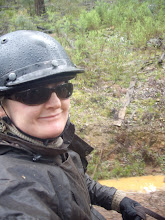 I concur. Whatever reservations one might have about Robert Heinlein later in life, I know I devoured his adventurous space tomes when I was younger.
I concur. Whatever reservations one might have about Robert Heinlein later in life, I know I devoured his adventurous space tomes when I was younger.* My favourites were 'Tunnel in the Sky' (I think I read it about 10 times) and 'The Star Beast' . In fact, I still have a tattered copy of the latter, and every now and then I revisit Lummox and remember how thoroughly enchanted I was by her as a kid (and still am), and how much I wished I had a gigantic Lummox of my very own in the back yard.









4 comments:
I've been reading Asimov's robot stories to my 11yo son. But he's already pretty keen on sf, so maybe that's not such a great example. As an aside, its interesting how many sf short stories are written with the main protagonist as a child. I think I'm noticing that more lately as I have one (a child, that is) who I'm wanting to introduce various stories to and, of course, he's always intrigued when there's a child in the story.
Hi Jen,
You have a child who likes Asimov? Congratulations! I recently bought a second hand, hardback copy of “I, Robot’ and reread my old favourites. I must say I like, and have more sympathy for Susan Calvin more now that I’m older and have a different perspective of what she's up against.
Using youthful protagonists in science fiction (and I know I’ve done it a lot) makes sense, I suppose, since growing up and sf share so many themes – travelling into an unknown future, struggling to understand the mores of an unfamiliar society, deciphering the often unintelligible language of aliens/adults, untested idealism questioning the illogicality and unfairness of controlling authorities, energy raging against a perceived complacency, the yearning for great physical / intellectual / ethical challenges that will measure one’s mettle, etc. These are the subject matters that kids, and discerning adult readers with more flexible minds (let me take a moment to pat myself on the head), want to bravely explore, and sf fits that bill - preferably with stories that are also exciting and include a dash of wit and wisdom.
The kirkus reviews article mentioned the best way to get children reading is to be seen reading yourself. There are heaps of studies to prove this point.
In schools we used to have a half-hour after lunch where the teacher and all the kids silently read. Do you remember doing that as a student?
After a while, I think teachers began to feel the pressure to be 'seen to be working' and the silent reading period began to involve the kids reading but the teacher interacting with students one on one.
I'm ambivalent about the earlier experiment. It was great for the kids to see the teacher reading, but it was not a natural situation, compared to an adult in the home settling in with a good book and the child seeing that reading is valued as a legitimate activity and not 'wasting time'.
BTW, I only discovered SF as an adult, when I had to read Day of the Triffids at Teachers' College. I was immediately hooked. Can you imagine poor me growing up without even knowing what Sf or fantasy were? Sad times.
Growing up without SF and Fantasy - there isn’t a law against that? Definitely poor you. But trust good old John Wyndham to lead you to the light. My first JW was ‘The Chrysalids’, and I read and reread his books the way kids probably read the Twilight books or HP these days.
I know what you mean about the artificiality of those set reading times at school, and I think the teachers should butt out rather than interact, but I think I’ll tip in favour of them, if only because they might have provided a template for predisposed kids from homes where (*shudder*) there were no bookshelves or adults with reading habits. However, it’s definitely best to just grow up with reading adults and to just think it’s a normal part of life. My own SF & Fantasy habit most definitely came from my Dad. It was from his library that I pulled the Asimovs, Bradburys and Clarkes, as well as Andre Norton’s Witch World series and Philip José Farmer’s Riverworld series. Case in point.
Post a Comment